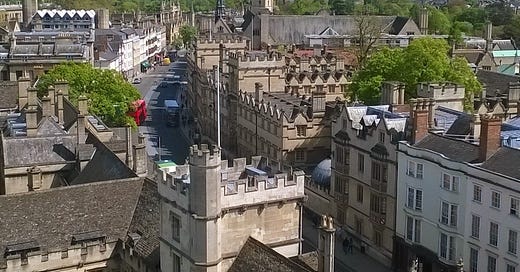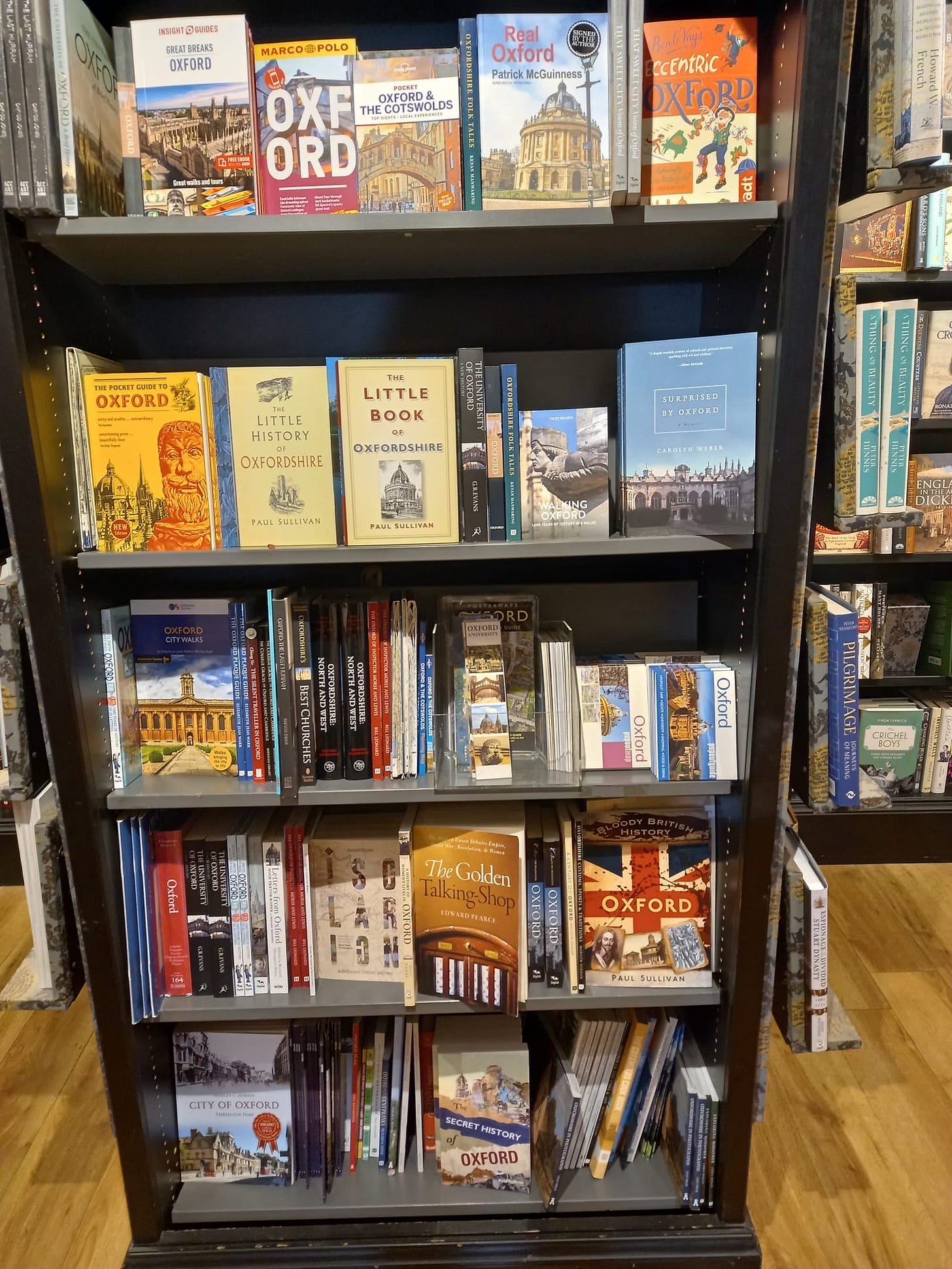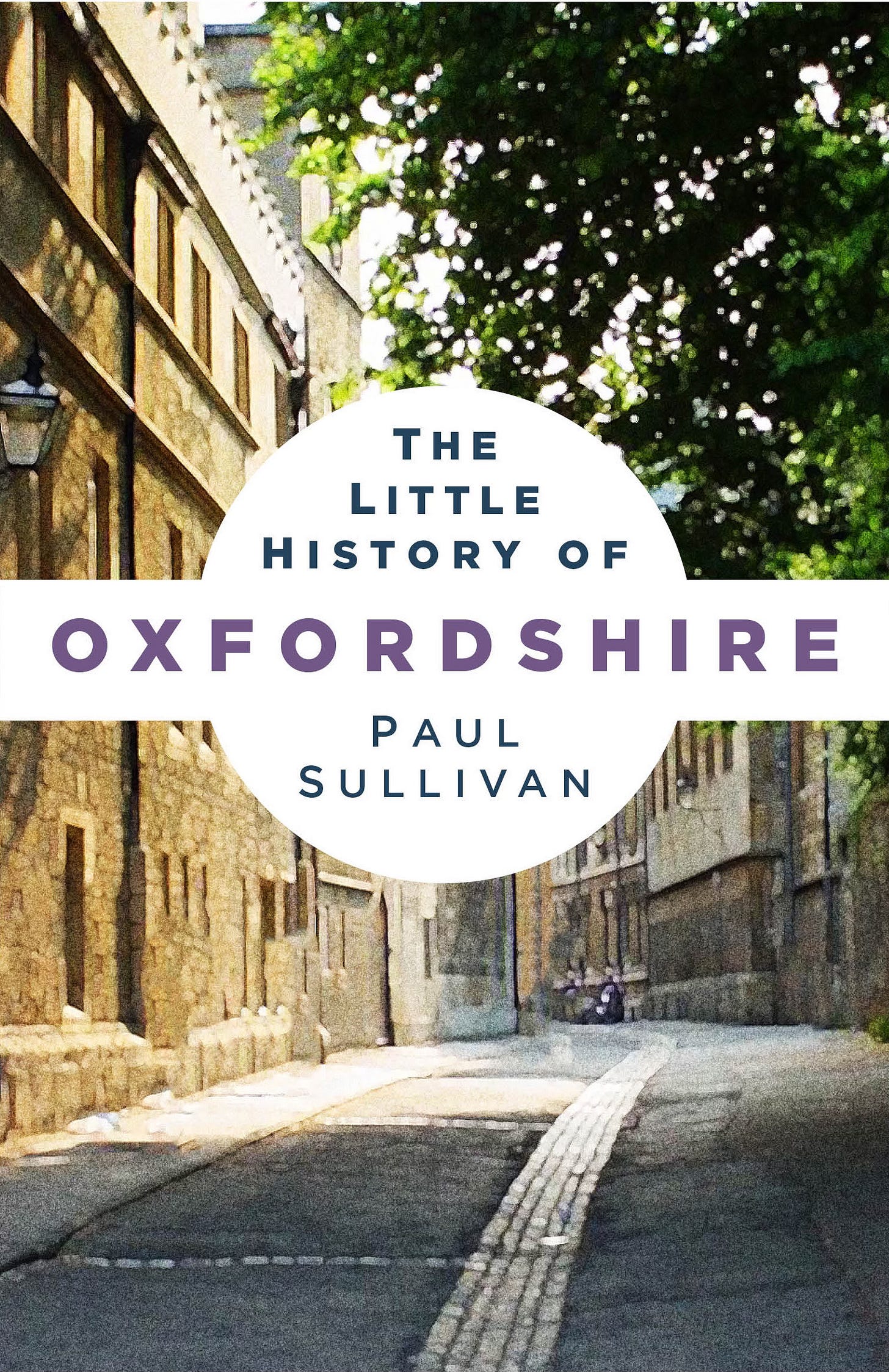Oxford High Street: Here be dinosaurs…
When writing my book A Little History of Oxfordshire (published in February 2019), I included in the preface an apology for anachronism – the crime of referring to the region as ‘Oxfordshire’ in the sections covering events pre-10th-century. It was a bit pedantic, but it always irritates me when people write about (for example) Oxfordshire at the time of the Roman Conquest, or mammoths roaming in England. Before you know it, there are Coelacanths in the Cherwell and Iguanodons prowling Oxford High Street.
This pedantry springs from my instinctive dislike and distrust of flag-waving nationalism. The piece of England that is forever England never existed. Nationalism has its roots in hot air rather than earth. A country is an idea that shifts endlessly across the centuries, and if you go back far enough, it disappears. Nationalism addresses the problem by reinventing the past in its own image.
The first genre of history I wrote about professionally was FML – folklore, myths, and legends. The older I get, the more I realise that 90% of historical narrative is FML – stuff created to instruct and entertain; political propaganda; tribal vendetta; an attempt to simplify chaos; stories that tap into national archetypes and motifs to present something simultaneously novel and familiar; or simply a little downtime offering respite from a life spent in toil and at war (that being the fate of most of the billions of humans who have trudged their way through history). Spin, in other words.
So, I asked myself, reviewing my completed Little History of Oxfordshire manuscript, had I managed to move beyond the FML narrative? What was I telling the world about this tiny part of the planet? What do people think of when they hear the word “Oxfordshire”, and did the book challenge those assumptions? On a more personal level, had it brought me any closer to a sense of belonging, a sense of home, or was I still a stranger in your country?
Home is where the past is
A county is many things. It might be home or childhood. It could be holidays, music festivals, and college. For people thinking of Oxfordshire from afar, it might be Morse, Lewis, Endeavour, and Midsomer Murders on TV. Perhaps Radiohead, Fairport Convention, Supergrass, or Bampton Morris. Boats on canals, tailbacks on the A40. Hedgerows and thatched cottages, Tolkien and Pullman, Edward Thomas’ over-invoked dreaming spires.
All counties have their parallel lists. We each have mental images, experiences, and memories of the places we’ve lived in or visited, whether as residents or visitors. And we all have needs and gut feelings when it comes to piecing together a personal sense of place. It is common to use this notion, and the history and observation that inform it, as a mirror reflecting ourselves and the wider world.
For many, home is as solid and heartwarming as golden Cotswold stone. For others, it is as unwelcome and nebulous as a nightmare or the sound of ghostly weeping in a midnight attic. For me, it’s something I think I once had, but I’m not sure where or when I mislaid it.
The longing for a physical sense of home that can either never be recaptured or never existed underlies my lifelong love of certain books (for starters, Gavin Maxwell’s Ring of Bright Water and Raven, Seek Thy Brother; Laurie Lee’s Cider With Rosie and As I Walked Out One Midsummer Morning; Gerald Durrell’s My Family and Other Animals trilogy; Thomas Hardy’s Jude the Obscure, The Mayor of Casterbridge, and The Return of the Native).
All pursuits of, or avoidance of, the notion of home are rooted in the past, in history – real, imagined, or both. It is tempting to imagine that history, like selective memory, maps out a reliable and verifiable chain of facts and truths that we can follow from A to B. But what if history isn’t the truth at all but a series of rewrites and reboots, a sequence of oversimplifications, misunderstandings, and subjective reframing? Not truth, then, but, as I said previously, spin - a reflection of prejudices, needs, and wants, our localised store of folklore, myths, and legends.
History, whether global, national, local, or personal, is a reimagining of what we think happened. It’s part of our memory, something we heard or read a few years ago. In recalling or recounting it, we change it incrementally, coloured by prejudice, romanticism, nostalgia, and a hundred other urges. In this way, no two histories can ever concur, hence the astounding number of volumes on, for example, William Shakespeare, Jack the Ripper, The Beatles, Adolf Hitler, King Arthur, etcetera, ad infinitum. Same people, different story.
Oxford: Same place, different story (yes, I confess - I chose the photo because it features four Paul Sullivan books)
The test of time
Like conflicting versions of events we recall from childhood, there is no certain way of knowing which versions of history are true. They all are, and none of them are. So, one way of clearing the board is to gain sufficient perspective to iron out all those inconvenient details, all those things that might constitute the troublesome truth or lack thereof. The details of personal and contemporary history can be put into perspective by stepping back, and then further back still, until the minutiae of history fade away and you are left with the oddly reassuring sweep of eternity.
The pursuit of historical perspective is highly recommended as a meditational aid for anyone bogged down in the present. As an example of the process, ask the broad question, “What happened in Oxfordshire one year ago?” (substituting your own chosen location) and answer it several times, adding a zero to the number of years at each turn. Like this, beginning in Oxon in the year 2019:
1 year ago: Brize Norton announces significant changes to its airspace regulations. Wantage gears up for its biggest-yet beer festival. The Oxford Blue Plaques Board propose a plaque commemorating Christ Church chemistry don Andrea Angel on Banbury Road, Oxford.
These stories are very much in keeping with the county’s contemporary sense of self – visible RAF presence, classic English ale brewing, and Oxford dons.
10 years ago: The Environment Agency announces that the flood threat in Oxfordshire has been greatly reduced. Anthony Gormley’s naked man sculpture is hoisted to the top of the Blackwell’s shop on the corner of Turl Street and Broad Street in Oxford. My partner Magda graduates with her MPhil from Oxford University.
All very familiar again – the dominance of the rivers in low-lying Oxfordshire, and Oxford’s place as a hub for artists and academics.
100 years ago. Still fresh from the traumas of the First World War, many Oxfordshire people struggle to find work and make ends meet. In Oxford, ground-breaking work into shell shock victims in a makeshift hospital in the grounds of New College leads to the development of modern psychiatry.
This grimly underlines one of Oxfordshire history’s abiding themes – war.
1,000 years ago. Anglo-Danish King Cnut holds court in Oxford. It is only ten years since the last major slaughter between local Anglo-Saxons and Danes, and the county of Oxfordshire, and the city of Oxford itself, has only been on the map for around 100 years.
This far back, Oxfordshire society is, from modern perspectives, alien. No modern English was spoken, just Saxon and Danish dialects, with Latin the preserve of clerics and scholars. One timeless theme is very much in the air, though – war, and the county leaders’ fraught relationship with their neighbours.
10,000 years ago. No Oxfordshire, no Saxons, Danes, or Romans, not even proto-Celtic tribes, who would not arrive in the region until around 5,000 BC. Aboriginal peoples live here, of whom there is no evidence other than the scraps bequeathed by archaeology.
The past is indeed a foreign country.
100,000 years ago. No humans yet, but plenty of snowbound wildlife in the midst of the Ice Age.
Not even any mammoth-watchers out there to appreciate it all.
1,000,000 years ago. Britain is not yet an island but a peninsula extending from the European continent. There are no Homo sapiens, but our close relative Homo antecessor is wielding stone tools, chasing large herbivores, and fending off the lions, tigers, and bears…
…Lions, tigers, and bears… and so on, back through geological history.
Everything we know and fret over has disappeared, so we can relax. We’re no closer to definitive truth or home, but we’re orbiting the problem rather than battling it at ground level.
Welcome to the continuum
A judgment on history, and a sense of our place in the continuum, requires a human presence in the story. But once those humans appear in the historical narrative, we make the mistake of identifying with them as time-travelling avatars. It is all too easy to imagine them as people with the same language, social pressures, hopes, and aspirations as us, toiling and struggling their way through history as a single, coherent population. Many readers want the island’s Aboriginals, Romano-Britons, Saxons, Danes, and Normans to be ‘English’. They want King Alfred to be the founder of Oxford University; they want King Arthur to be real; they want Robin Hood to be the fount of social-democratic principles; and they want everything to present some kind of moral lesson.
A historian can call out the myths and propaganda, offering insights into the diversity of history, how people lived, what they aspired to and achieved, and how they helped shape the physical, genetic, and intellectual landscape, the end results of which we live in today. But an honest one must come clean and remind the reader that, really, it’s all folklore. Reading history will get you closer to a believable truth and a sense of home if you want it to, but the decision is yours. If you decide this is your history, it will be. If you decide it's not, another history will arrive soon enough, like several buses with the same number going in the same direction but with different constellations of drivers and passengers.
So, the answer to the question, “What is my book going to tell the world about this tiny part of the planet?”, is this: a few stories, a couple of jokes, and a not-very-original sense of the past as a foreign country. Oxfordshire is a conduit of history, and it once felt like my home, but I’m orbiting too far above it to make out the details.
As the old song says,
I’m a stranger in your country and I’ll tarry for a while
Though I’m far from my homeland by many’s the mile.







Loved this post (and hello from Oxfordshire – I've often stood in front of those bookshelves pictured!).
I always thought Fairport Convention came from Muswell Hill, London N10.